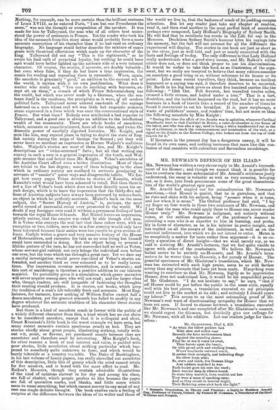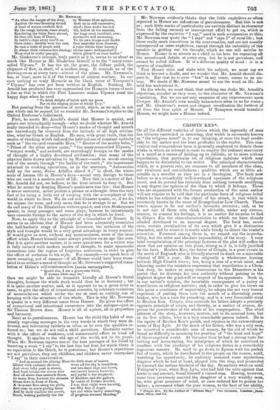MR,. NEWMAN'S DEFENCE OF HIS ILIAD *
Mu. Newman has written a very clever reply to Mr. Arnold's impeach- ment of his Homer ; and though we cannot think it is possible for him to overturn the more substantial of Mr. Arnold's criticisms justly understood, the essay is valuable as well as very amusing, bringing out, as it does, into fresh prominence some of the great characteris- tics of the world's greatest- epic poet. Mr. Arnold had singled out for animadversion Mr. Newman's assertions,—that Homer is quaint, that he is garrulous, and that he rises and sinks with his subject, being "preemie when it is tame, and low when it is mean." The Oxford professor had said, " I lay my finger on four words in these two sentences of Mr. Newman, and I say that the man who could apply them to Homer can never render Homer truly." Mr. Newman is indignant, not entirely without cause, at the sublime dogmatism of the professor's manner in schooling a man who is as superior to him in learning, and proba- bly in force of character, as he is his inferior in poetic insight, and has replied on all the counts of the indictment, as well as on the metrical indictment, into which we do not intend to enter. Metre is so completely a matter for taste rather than argument—it is so en- tirely a question of direct insight—that we shall merely say, as we said in noticing Mr. Arnold's lectures, that we feel quite unable to agree with either of the combatants. We believe Mr. Newman's ballad metre to be entirely un-Homeric, and Mr. Amold's hexa- meters to be worse than un-Homeric, a flat parody of Homer. The graceful specimens of Mr. Gladstone's translation, which Mr. New- man has extracted with such high praise, seem to us still farther astray than any attempts that have yet been made. If anything were wanting to convince us that Mr. Newman, highly as he appreciates Homer, does not understand hint, it would be his unqualified praise of Mr. Gladstone. "I do not hesitate to say," he says, " that if all Homer could be put before the public in the same style, equally well with his best pieces, a translation executed on my principles could not live in the market at its side ; and certainly I should spare my labour." This seems to us the most astounding proof of Mr. Newman's real want of discriminating sympathy for Homer that we have yet seen. If forced to-choose between a translation executed like Mr. Newman's and one completed after Mr. Gladstone's manner, we should regret the dilemma, but decidedly give our suffrage for Mr. Newman, with all his oddities. Let our readers judge for them- selves : Mr. GLADSTONE, Iliad 4, 422.
"As when the billow gathers fast
With slow and sullen roar Beneath the keen northwestern blast
Against the sounding shore: First far at sea it rears its crest, Then bursts upon the beach,
Or with proud arch and swelling breast,
Where headlands outward reach,
It smites their strength, and bellowing flings
Its silver foam afar; So, stern and thick, the Danaan kings And soldiers marched to war.
Each leader gave his men the word;
Each warrior deep in silence heard.
So mute they marcled, thou couldet not ken
They were a mass of speaking men:
And as they strode in martial might.
Their flickering arms shot back the light" • Homeric Translation, in Theory and Practice: a Reply to Matthew Arnold. Esq., .Professor of Poetry, Oxford. By Francis' W. Newman, a Translator of the ilia& Williams and Norgate. Mr. NEWMAN.
"-As when the surges of the deep, by Western blare uphoven,
Against the ever-booming strand dash up in roll successive; A head of waters swelleth first aloof; then under harried By the rough bottom, roars aloud; till, hollow at the summit, Sputtering the briny foam abroad, the huge crest tumbled' over: So then the lines of Dana, successive and unceasing, In battle's close array mov'd on. To his own troops each leader Gave order: dumbly went the rest, (nor mightest thou discover, So vast a train of people held a voice within their bosom,) In silence their commanders fearing: all the ranks wellmarshall'd Were clad in crafty panoply, which glitter'd on their bodies."
Mr. Gladstone's attempt, truly poetic as it is, seems to us about as much like Homer as Mr. Gladstone himself is to the " many-coun- selled Ulysses." It has the air, the grace, the diffuse polish, the elegance of flow, in short, of a modem song. It reminds us of the drawing-room at every turn—almost of the piano. Mr. Newman's, has, at least, more in it of the trumpet of ancient warfare. In our eyes nothing so truly Homeric as the blank verse of Tennyson's " 'Ulysses' has ever yet been written in English. Nothing Mr. Arnold has produced has ever approached the Homeric tramp of such a line as that. in which the Poet Laureate makes Ulysses recal the happy days when he used
"To drink delight of battle with my peers Far on the ringing plains of windy froy."
But passing from the question of metre, which, as we said, is not one which can be argued, let us consider Mr. Newman's replies to the Oxford Professor's indictment.
First, he meets Mr. Arnold's denial that Homer is quaint, and points out triumphantly enough—what we doubt whether Mr. Arnold really intended to deny—that Homer's modes of thought and speech are exceedingly far removed from the latitude of all high civiliza- tion, whether Greek or English. He says, with great truth, that the modes of thinking which induced the habitual use of constant epithets such as " the ox-eyed venerable Hera," " Hector of the motley helm," "Priam of the stout ashen spear," "the many-counselled Ulysses," "winged words," and so forth, are exceedingly foreign to the modes of thought of a highly developed civilization; that many of the physical facts drawn attention to by Homer—such as words coming out of the mouth through " the barrier of the teeth ;" the importance attached to cooking operations, as in the sentence, "Autornedon held up the meat, dietne Achilles sliced it ;" in short, the whole scale of human life in Homer's days—sound very foreign to those who are used to a modern scale of life. Now this is a matter of fact. Mr. Arnold did not, we believe, in the least intend to deny it. But what he meant by denying Homer's quaintness was this : that Homer is never eccentric, never prefers a phrase or a thought from the very fact of its being a little out of keeping with the atmosphere of the world in which he lives. We do not call Chaucer quaint, or, if we do, we miyuse the term, and only mean that he is strange to us. But we do call many of the Elizabethan writers quaint, and even Shakespeare quaint, in many passages and some plays, because he intentionally uses conceits foreign to the nature of the day in which he lived. Now, to apply this to the principle of a translation of Homer. It seems to us obvious: that if Homer had been adequately translated the half-barbaric stage of English literature, the archaism of the style and thought would be a very great advantage in every respect. It would give us now, without any unnaturalness, some of the same effect which Homer himself must always produce on an age like ours. But it is quite another matter, it is mere quaintness for a writer who is folly imbued with modern modes of thought, to make spasmodic excursions into the region of forgotten archaisms, in order to give the effect of archaism to his style. For example—we speak here of mere meaning, not of manner—if all Homer could have been trans- lated in as archaic a mood of thought as Mr. Newman's suggested trans- lation of Helen's self-condemnation (awns aaKopuriroo), " Qaoth she, I am a gramsome bitch, If woman bitch may be,"
then we might be able to translate literally all Homer's literal thoughts, because the whole work would then be in harmony ; but it is quite another matter, and, as it appears to us, a gross error in taste, to give the effect of intentional conceits, by arbitrary variations of nomenclature which strike the ear at once as entirely out of keeping with the structure of the whole. This is why Mr. Newman is quaint in a very different sense from Homer. He gives the effect of exceptional and intentional excursions into the antique—just as Sir Thomas Brown does. Homer is all of a piece, all in proportion and harmony.
Next as to garrulousness. Homer has the child-like habit of con- stantly repeating messages in the very words in which they were de- livered, and reiterating epithets as often as lie sees the qualities re- ferred to ; but we do not call a child garrulous. Garrulity carries with it the effect of weakness, and unsuccessful effort to wind off thought. It applies to the old age of the world, not to its youth. When Mr. Newman injures one of the best passages of his Illsad by inserting a weak " I say" in the last line but four, for which there is no equivalent in the Greek, he is garrulous; but Homer's repetitious are not garrulous, they are childlike, and children never interpolate " I say" in their conversation.
" And as around the shining Moon the little stars of heaven Glister with radiance dictinct, when all the sky is breathless
And every lofty peak is shown, and headland edge and forest:
And from behind the cloven blue uncounted heaven bursted', And all above thee seemeth Stars, and joyful is the shepherd: So many fires, betwixt the streams of Xanthus and the galleys, Shone then in front of Ilium, by hands of Troians kindled. A thousand fires along the Plain, I say, that night were burning, And ties: to every glaring blaze sat fifty foes of Argos.
And by their chariots the steeds, rye and white barley munching, Stood, waiting patiently the rise of gorgeous-throned Morning.' Mr. Newman evidently thinks that the little expletives so often repeated in Homer are indications of garrulousness. But this is nob so ; such little marks of particularity are entirely distinct in character from the failing memory or incompetent effort to get on, which is expressed by the expletive "I say," used in such a connexion as this., Mr. Newman may quote the "I says" and "says I" of rural life ; but these really mark transitions in the conversation, and are not usually interspersed as mere expletives, except through the imbecility of the speaker in getting out his thought, which no one will ascribe to Homer. Homer is as minute as a child in his love for repeating all the accustomed details at every step, but he is not garrulous, and cannot be called diffuse. It is a different quality of mind : it is a. species of simplicity.
That Homer rises and sinks with his subject, we must say we think is beyond a doubt, and we wonder that Mr. Arnold should dis. pute it. But that he is ever "low" in any sense, seems to us un- true. We doubt if Mr. Newman meant to use the word as Mr. Ar- nold has understood it.
On the whole, we must think that nothing can shake Mr. Arnold's objections, cavalier as they were, to the character of Mr. Newman's translation. But we are not very sanguine of any improvement upon Cowper. Mr. Arnold's own weakly hexameters seem to on far worse ; and Mr. Gladstone's sweet and elegant versification the farthest of all from the true spirit of Homer. If Tennyson, would. translate Homer, we might have a Homer indeed.































 Previous page
Previous page